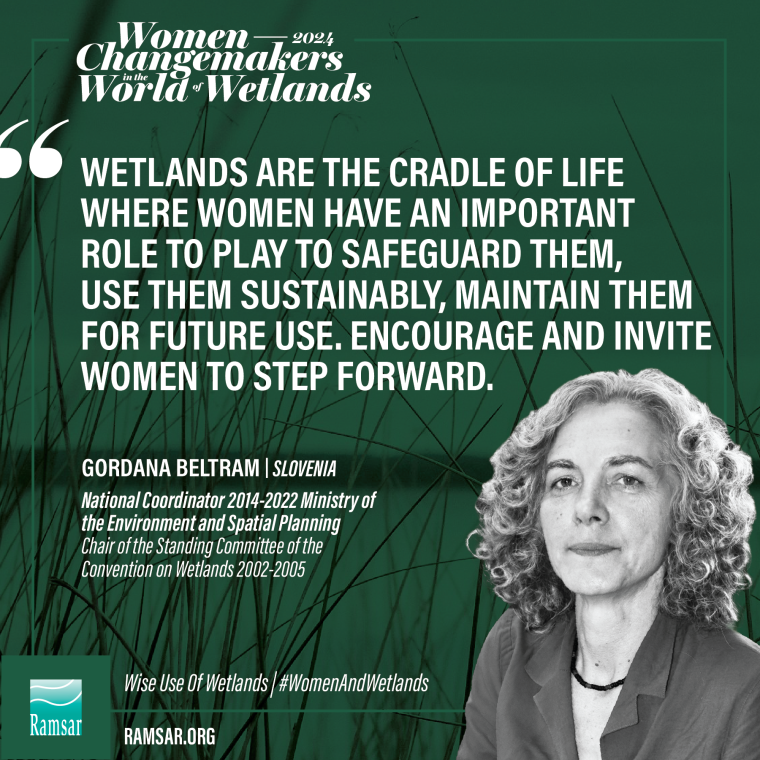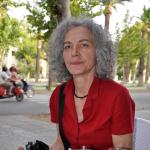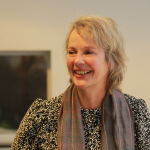
Gordana Beltram
National Coordinator 2014-2022 Ministry of the Environment and Spatial Planning Slovenia.
Biography
Gordana Beltram is a distinguished figure in the field of nature conservation and management, with a career spanning several decades. She has held key positions in various governmental and non-governmental organizations, contributing significantly to environmental protection efforts both nationally and internationally.
Beltram's professional journey began in 1982 when she joined Yugotours Globtour in Ljubljana as a tourist guide for English-speaking visitors to Slovenia. Her passion for conservation led her to pursue further education, culminating in a Ph.D. in Human Ecology from Vrije Universiteit Brussel in Belgium.
Throughout her career, Beltram has been deeply involved in wetland conservation and management. From 1997 to 2009, she served as the National Focal Point for the Convention on Biological Diversity and the Convention on Wetlands, playing a pivotal role in shaping national policies and initiatives related to biodiversity and wetland protection.
Beltram's leadership extends beyond national borders, as evidenced by her involvement in various international organizations and committees. She has served as Chair of the Standing Committee of the Convention on Wetlands, Chair of the Supervisory Council and Board of Association of Wetlands International, and Member of the Steering Committee of the Global Water Partnership, among others.
In addition to her professional commitments, Beltram is a prolific author, with numerous publications on wetland conservation and biodiversity to her credit. Her research contributions have enriched the global discourse on environmental sustainability and informed policy decisions at both local and international levels.
Gordana Beltram's tireless dedication to environmental conservation has earned her widespread recognition and respect both within Slovenia and internationally. Her contributions continue to inspire future generations of environmentalists and conservationists to work towards a more sustainable and harmonious relationship with nature.

Questions and Answers
What personal experience has shaped or inspired your journey?
Being someone perceptive of nature, the idea to devote my professional life to wetlands progressively matured. I grew up in the countryside, in a lower Vipava River valley. During my university studies environmental problems accelerated and I also included them in my bachelor’s thesis (environmental pollution in the Northern Adriatic). In 1983, I got my first professional job at the Nature Conservation Institute. It was in the decade of continuous environmental pressure, particularly land reclamation for agriculture in the river floodplains, infrastructure development, and hydropower use of the rivers. But it was also a decade of the first public opposition to build a chain of hydropower plants on the Mura River in Slovenia. I was closely observing all that was happening and was modestly involved but learnt a lot from actions taken to safeguard the river and its wetlands.
In 1989, I started my postgraduate studies in Brussels. After my MSc, my supervisor encouraged me to undertake a doctorate thesis – I contemplated what topic to choose? I discussed with my mentor in Slovenia and he said ‘Little has been done on conservation and protection of wetlands in Slovenia …’. The topic was intriguing and I took the challenge without really knowing much about wetlands. As a conservationist and geographer, I was not interested only in the ecosystem functioning, but also in people’s perception of and their attitude towards wetlands, actions taken to keep or destroy them… This was the beginning of the 1990s, just after the Grado Conference on the Mediterranean wetlands – but then, I was not aware of that meeting. But once I started I got more and more “passionate” about these incredible ecosystems, and their importance for biodiversity and human use, yet misunderstood and often misused or destroyed.
Who is the influential figure who has inspired your actions, and what specifically about them has been motivating?
There have been a few important figures who inspired my actions and decisions. Throughout my professional life, there was always someone who either inspired or challenged me and encouraged me to take action. But I have to first mention my mother who raised me to be respectful of nature and all living beings. This was very much shaping my interests later in my life. After my bachelor’s degree in geography, I started to work at the Institute for Conservation of Natural and Cultural Heritage in the in early 1980’s. My colleague, Matjaž Jež, a biologist, was ‘an open book’ – His knowledge and local experience, but also passion and attitude - the importance of our work to protect and conserve natural heritage. Stane Peterlin – the backbone of nature conservation in Slovenia was shaping my personal interest and passion for wetlands. Prof. Dr. J.J. Symoens – my mentor for my PhD thesis who always challenged me, and made me work hard to respond to his endless questions. But the more I learnt about wetlands the more dedicated and committed I became for their protection and wise use.
Luc Hoffmann was one of the readers of my thesis, and together with Thymio Papayannis led me closer and closer to focusing and committing to the wise use of Mediterranean wetlands. I developed an extensive network of experts and institutions working on wetlands and I could give you many more names of colleagues who helped shape my path and work for wetlands at the local, national, regional, or international level. When I started to work for the Slovenian government in the late 1990’s I soon became a national representative for global and regional conventions and agreements on biodiversity, and I got increasingly involved in international issues, always particularly focusing on wetlands. I can say that wetlands became part of my personality.
As a woman who has made significant strides, where can you say investment is required to accelerate progress and empower women’s actions for wetlands?
There were numerous obstacles and constant challenges throughout the last forty years. One of the intriguing factors to stipulate actions was the people’s perception and attitude towards wetlands in different disciplines and sectors, particularly in agriculture, water management, and infrastructure. As an example, when I started to work at the Environmental Agency, we were organizing a training course for nature conservation and water managers in Slovenia with the help and experience of Tour du Valat. It took quite an effort to get the water colleagues to participate, and the initial feedback we got was, "You nature conservationists" are interfering with our work, we are responsible for water management you for wetlands’. But we did not give up.
It took time, continuous dialogue, and communication to change their perceptions and attitudes towards wetlands. I was confronted with these perceptions in different projects and with different sectors. Gradually we did break through and now we have successful wetland conservation and restoration projects where different sectors are partners and work hand in hand with full commitment. But I cannot say I did it. It was always teamwork.
All women in this category : Wise Use of Wetlands

Gordana Beltram
National Coordinator 2014-2022 Ministry of the Environment and Spatial Planning Slovenia.
More information
Dr. Siobhan Fennessy
Professor of Environmental Studies & Biology, Kenyon College
More information
Ximena Giraldo
Senior Advisor in Economy, Trade and Finance Embassy of the Kingdom of the Netherlands
More information